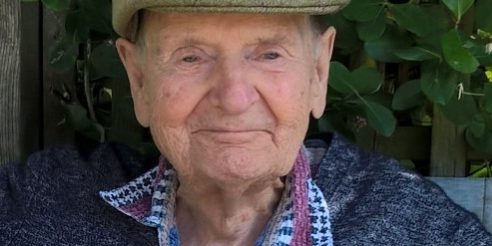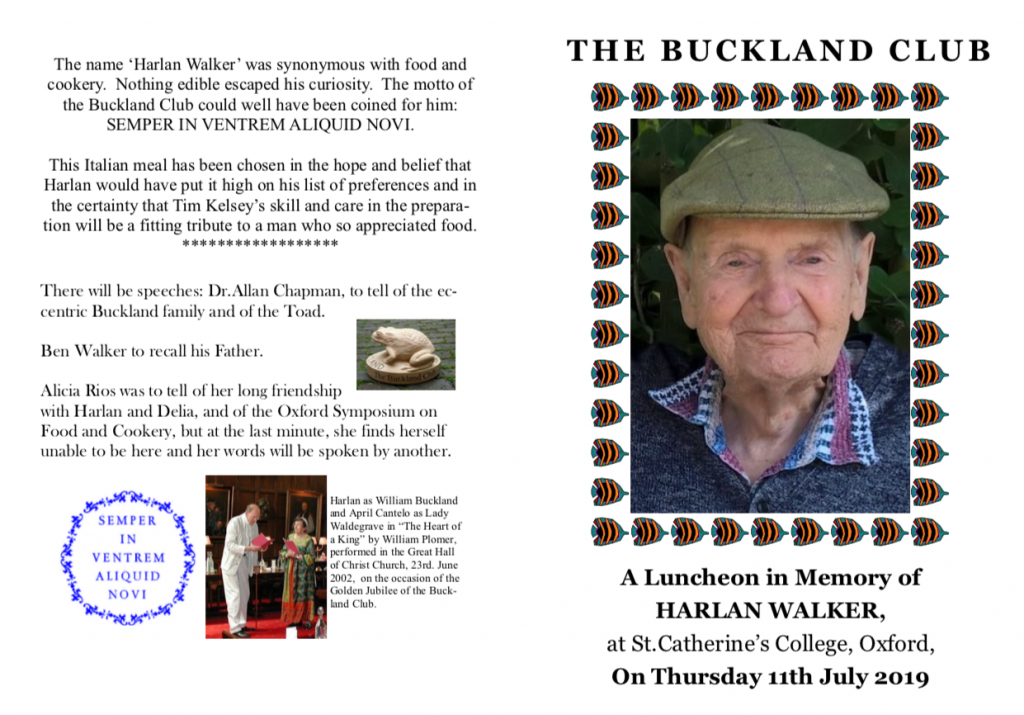Venue: St.Catherine’s College Oxford,
Date: 11thJuly 2019
Minutes of the Lunch
Some fifty people, family and friends of Harlan, fellow members of the Buckland Club and Oxford Food symposiasts, gathered to remember Harlan, in the gardens of St.Catz.
Dr Allan Chapman engagingly related tales of William Buckland and his eccentric family, including Frank, his son, after whom the Club is named, and of the Toad that has resided since 2002 in the garden of the Archdeacon’s Lodging in Christ Church but which had been brought to St Catz for the occasion.
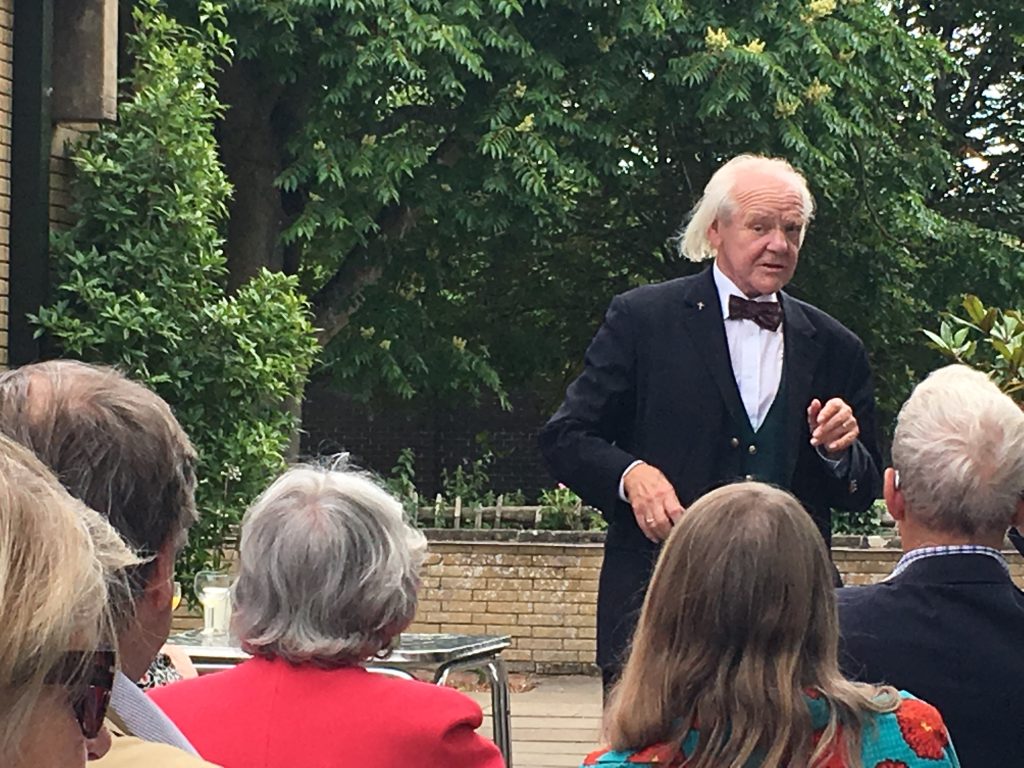
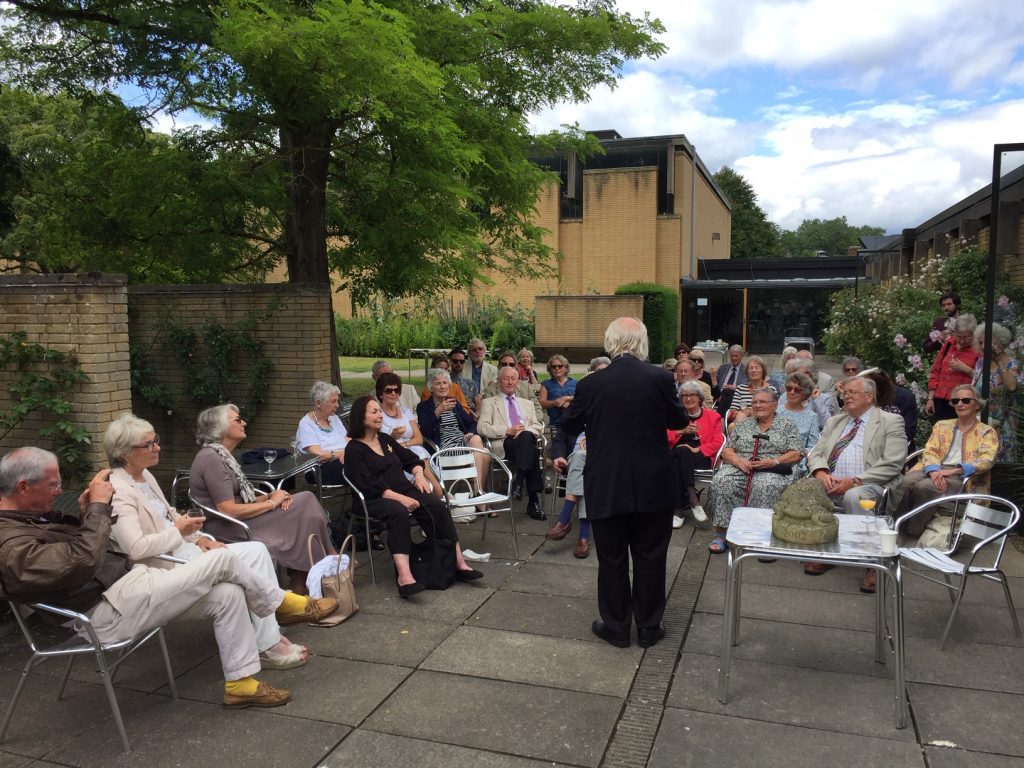
Harlan was Chairman of the Club for many years and had invited many symposiasts to talk and to arrange menus for club gatherings.
Ben Walker spoke movingly of his father, that remarkable gentleman we all remembered so well.
Alicia Rios, long a good friend of Harlan and Delia, had prepared a speech but unfortunately was prevented from attending at the last minute. Tom Jaine read her words splendidly in impeccable English, yet losing none of the dramatic, Spanish notes.
After the speeches we enjoyed a well-chosen Italian lunch, cooked beautifully by Tim Kelsey and his équipe, with Italian wines that suited the meal and the warm day. I found myself thinking how much Harlan would have enjoyed it.
Jill Norman
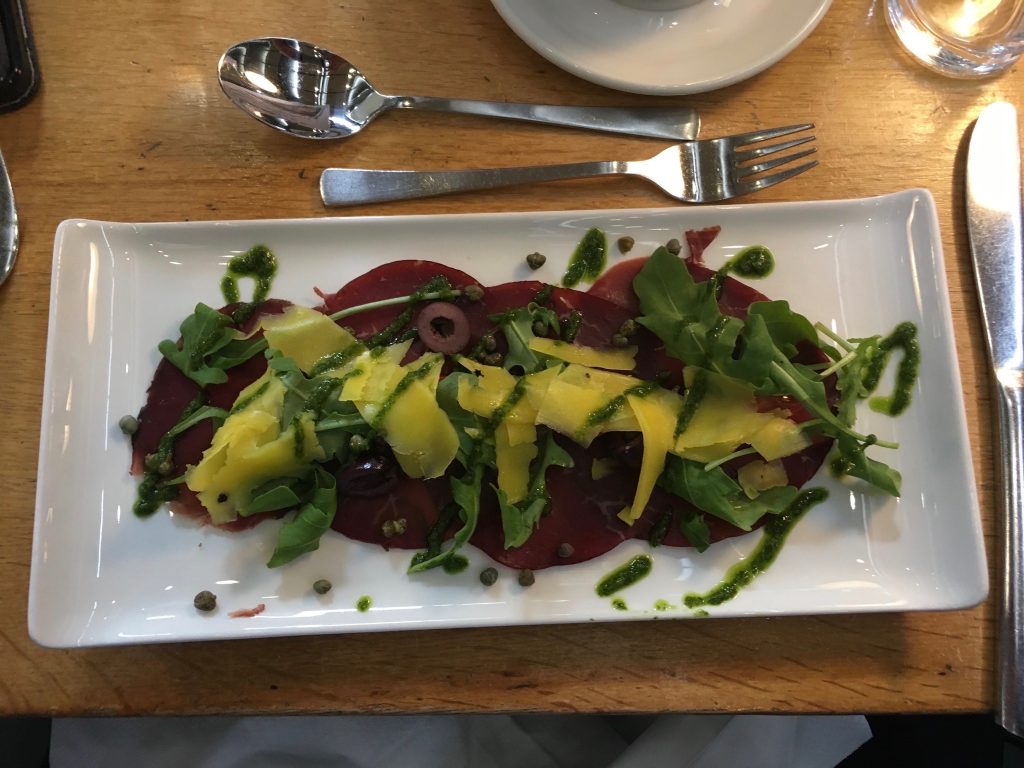
Lombardy Beef Bresaola
Footnote: the Toad, carved by the son-in-law of the late Prof. Bryer, sometime Minutes Secretary of the Club, was installed in Christ Church on the occasion of the club’s Golden Jubilee. It recalled the Dean’s Toad-in-the-Hole experiment, conducted in the garden of the Lodging where Frank was born.
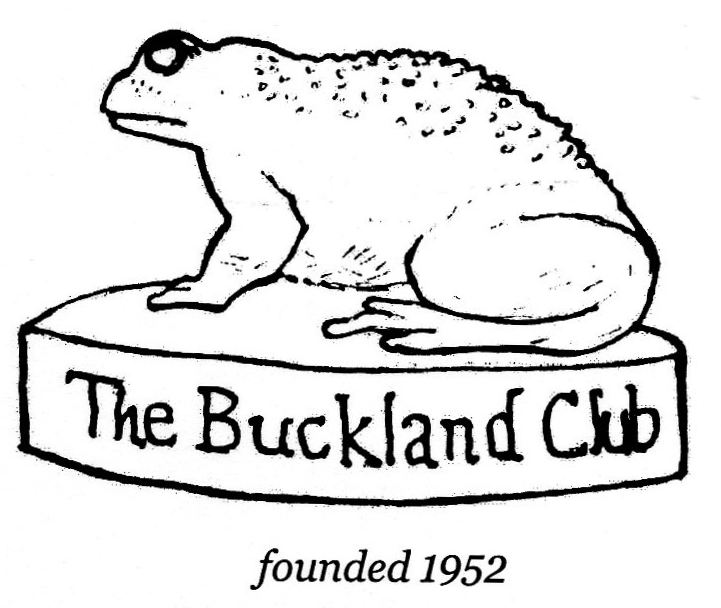
Oxford was chosen as the venue firstly because it had been the scene of one of Harlan’s particularly serendipitous contributions to the club, (a performance, with April Cantelo, of William Plomer’s dramatic poem “The Heat of a King”) and secondly because it provided an opportunity for his symposiast friends to attend, the day before the Symposium commenced.
Below are transcripts of Ben Walker’s words as delivered at Hagley Road Village in 2018 and those of Alicia Rios, read by Tom Jaine, together with the menu card.
Roger Hale
22.07.2019
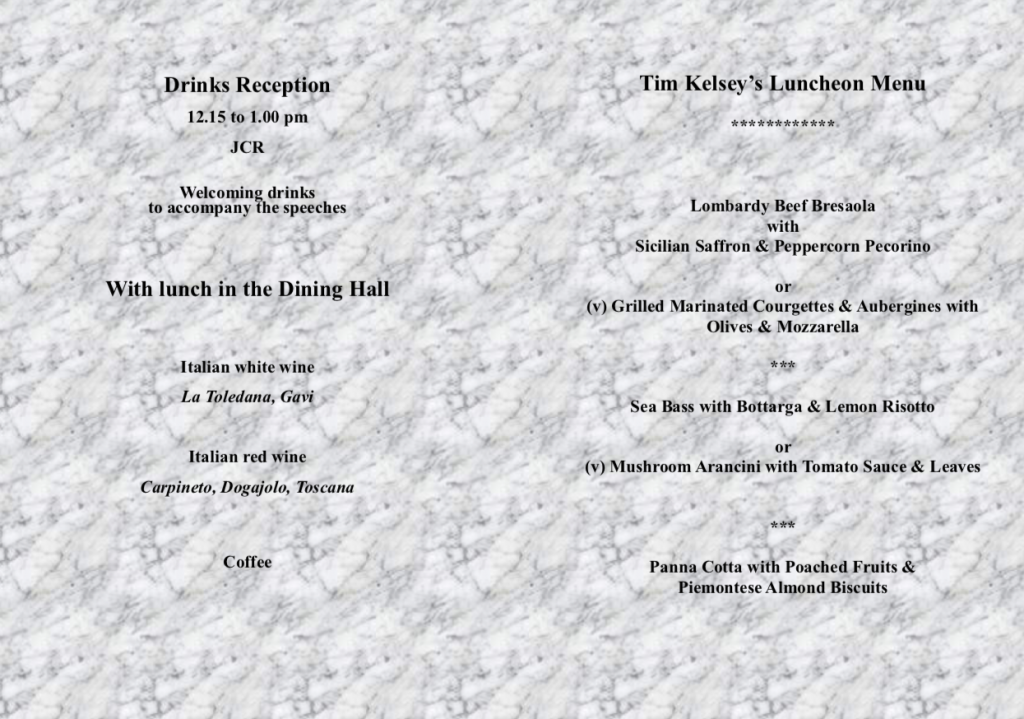
Ben Walker’s Words on Harlan
A recent letter from Poppa’s doctor to a hospital consultant started with the words “This Remarkable Gentleman”, and we could probably never come up with a better epitaph for him than that. He was a remarkable gentleman in so many ways, and so many people we’ve spoken to since his death have commented on this – they’ve said that he was unique, one of a kind, one in a million. ‘One in a million million’ said Alicia.
Poppa had a fabulously positive outlook on life, and this positive attitude rubbed off on everyone around him. Everywhere he went people loved him – even on recent hospital visits he immediatelybecame the nurses’ favourite, with his charm and his silly jokes and his delightful singing, whether in English, Italian or Greek.
He had a remarkable impact on the people that he came into contact with – he made them smile, he entertained and inspired, he made people love him.
He had an extremely accomplished life, and yet he was completely unassuming. He tackled each project with enthusiasm and was driven to do absolutely the best that he could, whatever the circumstances, and yet he never bragged about any of his achievements, whether this was revolutionising the preparation of food at Music Camp, cooking for 150 people on non-existent cooking equipment at Highnam Court, managing a successful international company or his amazing dedication to the Oxford Symposium of Food and Cookery.
- He was a bon vivant without being a glutton
- He loved food without being a food snob
- He was intellectual without being pretentious
- He liked to dress up but was not in the least bit vain
- He was modest, and yet quietly confident in his own abilities.
His intellect and love of languages led him to learn Greek, German, French, Italian, Spanish, Japanese and to brave speaking all of these languages even though he was not fluent in all of them. One of my proudest moments in recent years was taking mummy and poppa to visit Tina’s family in Italy and seeing Poppa sitting at the head of the table conversing with his hosts in near perfect Italian.He never allowed himself to dwell on the negative aspects of life, always maintaining a cheerful disposition. He didn’t dwell on past wrongs or slights and he never complained about anything orhad a bad word to say about anyone – and indeed it would be no exaggeration to say that no one who had ever met him had a bad word to say about him. He never made a fuss about anything. He even treated visits to the hospital with almost as much enthusiasm as he would a trip to the theatre, and he made sure to treat the people he met there, whether staff or fellow patients, with his usual kindness and good humour. Many of you will have heard him remark after having had a seriousoperation on his intestines to remove a tumour: ‘Better a semi-colon, than a full stop’.
He passed this positivity on to us – I remember Becca was cooking lunch for visitors at the cottage one Easter and her quiche had gone disastrously wrong. Poppa persuaded Becca that we should telleveryone that she had cooked the famous delicacy: “Shropshire Glompy” and that everyone would be amazed at her culinary skills. Sure enough, the Glompy went down a treat, only to be followedlater in the year by the legendary pudding “BohorthaSchniddles”, made if I remember with crushedbiscuits, peaches and whipped cream. I think that it was this unflappability and resourcefulness that made him so successful both in the kitchens at Camp, Shawford Mill and Highnam and as the organiser of the Symposium. These were environments where events regularly did not turn out as planned, and yet Harlan was able to find imaginative solutions, and turn potential disaster into triumph.
He (and mummy of course) had so many friends – people they had met through music, through food, through walking holidays and book clubs. People who came to stay at their house after a concert became lifelong friends, as did au pairs. Lodgers would come back to visit for years after leaving their house. And their hospitality was legendary. Impromptu after-concert ‘snacks’ would go on late into the night and I can still recall vividly the smells filling the house when he was preparing one of his amazing Chinese feasts. Later in life, they discovered ATG walking holidays and InScape tours, which allowed them to continue feeding their need for good food, good walks and good company.
His love of entertaining started very early on. At Merton college, shortly after the war, the smell of garlic cooking in olive oil would permeate his quad as he cooked delights for people on the single bar electric fire in his room.
He and mummy had regular visitors who were decades their junior, but these were not just acquaintances, but true friends. This is testament to their warmth and generosity, their hospitality and above all their appreciation of friendship, of shared experiences, of the pleasures of social interaction that are the cornerstones of a life well-lived.
As Nicholas said in his recent letter: ‘Even in extreme old age, he gave such pleasure to so many.’
When I was young there were three adults whom I looked at as role models. These were Josi, whowas mummy’s housemother at the Quaker school she went to in Holland after leaving Germany, myAunt Biti, Delia’s sister, with whom I carried out long transatlantic conversations by letter, another quiet, unassuming polymath and Harlan’s uncle Bob, Bobbin’s father, Lucinda’s grandfather, who took on something of a surrogate father role for Poppa when his own father died. All three of these were gentle, kind, passionate and compassionate, good-humoured, non-judgemental. These were the qualities that I valued in adults: their attitude towards life and other people were the values that I wanted to embody myself as I entered adulthood. It’s clear to me now, although I didn’t realise thismyself until much later on in life, that Poppa was the ultimate of these role models for me, someone who I respected enormously, and whom I grew closer too with every passing year.
From Poppa I have inherited my love of reading, of walking, of listening to music and visiting the theatre. I have also inheritedhis silly sense of humour, his penchant for wearing flamboyant clothes on formal occasions and the habit of leaving the writing of speeches until absolutely the last minute.He taught me to appreciate those things which I now cherish in life – good food, late-night boozing, and the company and friendship of others above all else.
His relationship with Delia has also, I think, become a blueprint for the way I conduct my own relationships – he loved Mummy wholeheartedly, unreservedly, uncritically, and I so admired the many ways in which he demonstrated his for love her both publicly and privately. From him I have learned the value of open-hearted relationships, of commitment, of love itself.
I think that for all of us children, our relationship with Poppa has flourished in the years since Mummy died. We’ve treasured the time that we’ve had with him, and he seemed to enjoy our company even more than ever before. There was nothing complex about our relationships with him– no pretence or things left unsaid. He accepted care, help and support from ourselves and the wonderful team at Hagley Road Village gracefully, without hesitation or embarrassment. He was very happy to spend the last few years of his life here – it helped him to remain resolutely independent to the last, and for this and for the many, many kindnesses shown to him by Sharolyn and the other staff at Hagley Road Village, we are immensely grateful.
He was truly the best dad, someone who you could not but feelimmensely proud of. I was proud to be his son, to be part of his wonderful family, to be his friend andcompanion, proud to be a small part of the amazing events that he catered for or helped to organise.At the Symposium, at Music camp, at parties and extended family gatherings, it was clear how much he was loved and respected, how much people enjoyed his company and appreciated his enthusiasm, his intellect, his wit and good humour.To be his son was to be associated with someone quite unique and wonderful.
I know I speak for all of us when I say we loved him immeasurably, unreservedly, and will miss him more than we can say, this remarkable, irreplaceable gentleman.
Ben Walker
-oOo-
A Tribute by Alicia Rios on Behalf of the Oxford Symposium
Hello dear friends,
I feel so honoured and moved to be able to present Harlan Walker to such a distinguished audience!
I am lendingmy voice not only to the glorious number of veterans present here but, also, to those who, like Harlan Walker, are absent, and will not be able to join us any more.
It is very moving to see the size of this year’s edition of the Symposium since it was the objective when it was born that the seed planted by the pioneers would germinate, grow and expand to this extraordinary level of excellence.
Harlan has been the soul, the mind, and the hands of the Symposium since its origin. No one could have ever imagined that the Symposium would work without him. By him I mean Harlan the Nile, the cluster of the whole family: Delia, his faithful wife and extraordinary professional flute player, plus their children Philip, Becca and Ben who acted as five brains and 10 hands, or 1000 hands in one to enlarge, still more, Harlan’s effectiveness.
Other circumstances existed at the time of the birth and the origin of the Symposium. During the mid 80’s something reigned that today doesn’t exist anymore, and that is freedom.
Nowadays everything is either compulsory or is forbidden.
Imagine that then it was legal, and the Symposiasts were expected to bring from home the ingredients and the dishes that illustrated the core of the contents of their papers. Imagine home-cooked delicacies brought by attendees personally from so far. We created edible thematic maps of the world as we assembled the delicacies offered for the lunch and dinner banquet tables of Sant Antony´s College served at the Refectory. Everything arrived from so far as the Philippines, Indonesia, Adelaide or Poughkeepsie.
When the Symposium started, all sorts of initiatives were welcome and affordable.
Welcome and affordable thanks to Harlan Walker who was able to orchestrate the increasing complexity of the tasks and hopes nurturing the magma of the Symposium. The annual editions evolved in the shape of the sum of knowledge, experience, curiosity, devotion, enthusiasm, imagination, energy and commitment contributed, edition-after-edition, by the increasing number of Symposiasts.
The divers skills of its attendants was a releaser for Harlan Walker who was able to cope with all the physical and mental peculiarities and curiosities being brought by the attendants arriving from all five continents.
Harlan Walker’s gestaltic personality was a synthesis of a hyper -thoughtfulness and trustworthiness attitude with a unique fluidity and easy-going ability to get every requirement of the Symposium under control as if it were an easy task. He was always in a perfect unstable equilibrium, making everyone happy and relaxing all of us instantly.
We must not forget the relevant trait of his exhuberant sense of humour which radiated through his smile and his roguish gaze.
Harlan Walker exceded the limits of the Kantian categories of Space and Time. Not only did his day last, at least, 72 hours;he was the incarnation of VirginiaWoolf´s literary character Orlando. He was an inexhaustible traveller like Odiseo, a hedonist like Dionisios, he was mistic and sober like a Gothic monk, an adventurous poet like John Donne.He was a humanist like Erasmus from Rotterdam, a revolutionary like Voltaire, a galant man like the men from Watteau’s paintings, a philosopher like Bertrand Russell or a vanguardist artist like Kandinsky or Stockhausen as there were no limits to his educated curiosity and to his alert soul and heart.
In fact he was, in addition, an eccentric scientific-minded person.
He embodied the quintessencial wit of his idol, Frank Buckland, a naturalist of the XIXth century was a primigenial foodie person. In homage to him, Harlan, plus some other equally enlightened friends and colleagues, founded the Buckland Club based in Birmingham where the Walkers lived.
This institution brought to life Buckland’s ideal of extending the food habits of the British. He was a pioneer in importing and adapting to their homes and public spaces the cooking and eating ways from abroad. During his research journeys around the world, Buckland observed, studied and tried not only the basic edible and drinkable staples but, also, the most shocking and luxurious ones, assimilating the cultures of the inhabitants of the five continents.
I have brought some memorabilia that Harlan gave me during the 37 years we shared asattendants of the Symposia. They show the extensive spectrum of Harlan´s initiatives and the extent of his finesse and productivity. So, please, have a look and examine them to admire and grasp his unparalleled productivity, the degree of his excellence in every domain of life and of culture.
Harlan was a real diplomat. He was able to dilute the slightest sign of violence or irrational behaviour. Not only was he a pacifist but, also, an extremely practical-minded person. This was so in all orders of his private and public life, in order to prevent any risk of losing time and energy.
To conclude, I will describe to you a poetic occasion when, at dawn, on my first day in Oxford to attend the third edition of the newly-born Symposium, Harlan, a graduate at Oxford, silently took me to explore, to walk through all the gardens and parks of the Colleges, the city center, the riversCherwell and Thamesand, then, introduced me to Jane and Alan Davidson, to Theodor Zeldin, Claudia Roden, Sami Zubaida, Jill Norman, Ray Sokolov, Gillian Riley, Sophie Coe, BárbaraSantich and so many, many more before starting theOpening session.
On other occasions, Alan Davidson, that same first year, while driving his pale green platinum Rolls Royce, back in London, took me to share his usual visits to his favourite Travel and Maps bookshops and to altogether enjoy the decadent high-tea saloon at Fortnum & Mason.
¡Viva Harlan Walker!
